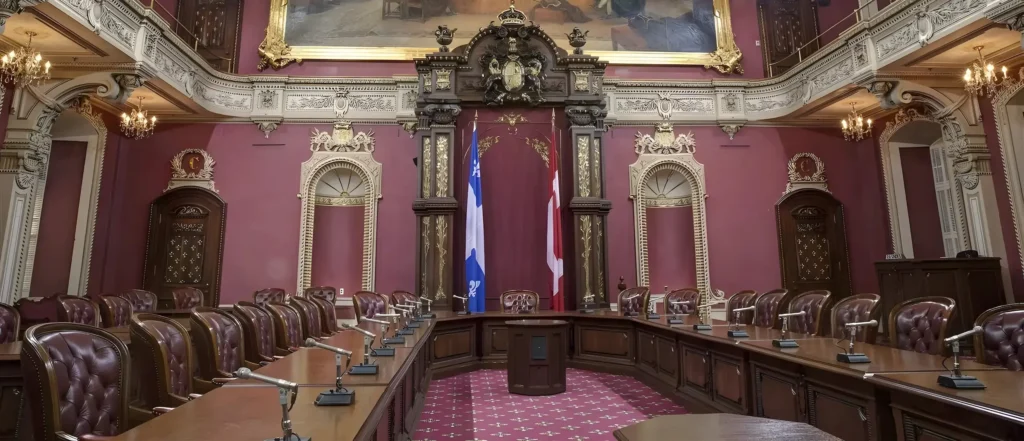After a short parliamentary session in the autumn, the start of 2023 is seemingly sober on the Quebec political front. But this impression was short-lived. The year begins with the announcement of a spectacular health reform, while hospitals are once again completely overcrowded. In education, too, we're about to see major changes under the reign of the hyperactive Bernard Drainville. As Nathalie Roy becomes the second female president of the National Assembly (Louise Harel briefly held the post in 2002), we are being told with great fanfare that the "boy's club" in this more honorary than strategic role is coming to an end. On the economic front, we are warned of the risk of a recession in the second half of the year, encouraged by a possible drop in inflation. Never mind, Catapulte is on the front line, analyzing the movements of the parliamentary hills.

18 outstanding news stories
Hide these consulting firms from my sight
January
As a parliamentary inquiry targets the American consulting firm McKinsey in Ottawa, we learn that in 2020, during the pandemic, thousands of dollars in contracts were awarded to this same firm for the government's communications strategy, procurement, the hiring of staff in CHSLDs and for assistance in making major decisions. Although the government admits that it does not want to know about McKinsey's other clients, the appearance of conflicts of interest is nonetheless worrying. Although it is not uncommon to call on external consultants, it is above all the devaluation of expertise within the public administration and the exorbitant costs of these services that are being denounced.
A controversial appointment, missteps and apologies
February
On February 24, the National Assembly voted, with the exception of Québec solidaire, in favor of a motion opposing the appointment of Amira Elghawaby as Canada's Special Representative for Combating Islamophobia, due to her controversial comments on Bill 21 in particular. Meanwhile, a tweet from Liberal MP Jennifer Maccarone, who supported the appointment, embarrassed her party so much that she was forced to make a mea culpa. Justin Trudeau persists, but comes to the defense of Quebecers who are victims of Quebec bashing, all in an effort to avoid having to relive the episode of the law on secularism.
Final postponement of 4-year-old kindergartens?
March
In 2018, François Legault stated loud and clear that he was putting his seat on the line on one issue: 4-year-old kindergarten. If he didn't create 2,600 places, he would leave office. The pandemic, a shortage of manpower and construction delays resulting in a shortage of space in schools helped to postpone the promise by 4 years, and not surprisingly, the Premier is still in office.
SAAQ - The twists and turns of a failed techno turn
March
The Société de l'assurance automobile du Québec had a plan. Everything was supposed to go smoothly in this transition to better service management involving a major digital transition. Instead, we've witnessed monstrous queues, frustrated users and embarrassed employees. A crisis takes time to resolve, so the attempt to implement facial recognition a few months later didn't enjoy much momentum.
Quebec budget: a telegraphed tax cut
March
A promise made, a promise kept: Finance Minister Éric Girard's fifth budget since taking office was a tax cut that caused little controversy. The decision, decried by a number of public policy experts and civil society groups, is seen as a mistake that, in the long term, risks limiting the Quebec government's ability to act in its spheres of intervention.
Better supervision of child labor
March
The entry of (very) young teenagers into the job market is far from going unnoticed. A visit to your favorite fast-food chain is all it takes. With this motivated but inexperienced workforce, however, comes an increased risk of accidents or abuse on the job, as CNESST figures attest. That's why the Minister of Labour, Jean Boulet, decided to legislate on the issue by tabling Bill 14, An Act respecting the regulation of child labour. The bill was passed unanimously, without major amendments, in time for the summer period.
Roxham, the end of a long journey
March
The Parti Québécois' hobbyhorse last fall, François Legault's party picked up the torch earlier this year, calling for the closure of Roxham Road. In 2022, nearly 40,000 of the more than 92,000 asylum seekers in Canada passed through Roxham Road. The parties called for renegotiation of the Canada-U.S. Safe Third Country Agreement, questioning in particular Quebec's capacity to receive asylum seekers. Joe Biden's visit speeded things up, and on March 24 the two countries reached an agreement, with Justin Trudeau announcing the closure in just 24 hours. Although applauded by some, the closure has been criticized, not least because many refugees are still trying their luck via Roxham, or even more dangerous routes.
More than 1,000 articles to reform the mammoth
March
Tabled on March 29, and with the public consultation phase already over, Bill 15, An Act to make the health and social services system more efficient, will not have been adopted this session, despite Christian Dubé's initial intention to do so. This umpteenth reform, announced during the election campaign and carried out by an ambitious minister, has given rise to a major mobilization of civil society, opposition parties and players working in all the key healthcare sectors. After Jean Rochon's ambulatory shift in 1995, Gaétan Barrette's reform in 2015, largely inspired by the Clair report published in 2001, the Minister wants to "shake up the pillars of the temple". Expectations are immense, but society has never been so determined to see the mammoth finally tamed.
A fund and royalties to protect our blue gold
April
With his Bill 20, Environment Minister Benoît Charette proposes to increase government revenues from water royalties by 900 %. This step, welcomed by the environmental community, comes not a moment too soon: the regulation in question had not been amended since 2010. Quebec received only three million dollars for the 811 billion liters of water drawn from its territory in 2021. The bill also implements an announcement made in the last budget, namely the creation of the Fonds bleu, with an initial envelope of $500 million over five years. At the time of writing, however, this fund is still undergoing detailed study.
How to remove the thorn from private agencies without hurting yourself
April
Health Minister Christian Dubé's mega-reform of the health care system is not the first time he's pulled off a stunt. On April 18, without fanfare or fanfare, the MNAs unanimously adopted Bill 10, which would limit the use of private employment agencies, banning them as early as December 2024 in major urban centers, and one year later in other regions. It's no coincidence that the Minister is trying to remove this thorn in the side of the network at a time when public sector collective agreements are being negotiated. His ultimate goal: to repatriate staff to the public network, which will be no small task.
U-Turn on the motorway section of the third link
April
The Caquist government surprised many with its decision, starting with its own caucus, to abandon the highway portion of its Québec-Lévis tunnel project. Transport Minister Geneviève Guilbault claimed to be basing her decision on the latest data collected by her department, but in the days that followed, the figures were contradicted. The oppositions, for their part, seized the opportunity to question the CAQ's real motives. First and foremost was Éric Duhaime, who took advantage of Minister Éric Caire's fragile posture to circulate a petition demanding his resignation.
A contentious pay rise
May
Increasing MPs' salaries is like Groundhog Day: no matter when it's proposed, there's never a "right time". While the Liberals were quick to support the government, Québec solidaire and, to a lesser extent, the Parti Québécois strongly criticized this increase decided by and for elected officials. Québec solidaire is determined to stand out in this debate, denouncing a $30,000 increase for itself this year. Co-spokesman Gabriel Nadeau-Dubois, although keen to set an example, did not require his caucus members to give back their pay rises to the community. The CAQ went ahead despite the irritants: bill passed!
95 No camp expenses: unanimous motion at the National Assembly
May
Almost 28 years after the 1995 referendum, the National Assembly unanimously called for the lifting of the veil on documents sealed for "eternity", detailing the expenses incurred at the time by the No camp. Wednesday's motion by the Parti Québécois instantly brought the debate back into the headlines. The willingness of all elected officials to be transparent at such a pivotal moment in Quebec's history is to be commended. The DGEQ doesn't seem to be acceding to the request, and we probably haven't heard the last of it!
Economic immigration... 100% Francophone
May
During the election campaign, the CAQ wanted to make language a major issue in immigration, declaring that it would be "a bit suicidal" to raise the thresholds. A few months later, the government announced it was aiming for 100% Francophone economic immigration. In May, it announced that it wanted to reach this target as early as 2026 and, against all expectations, that it was also considering raising the thresholds from 50,000 to 60,000 permanent immigrants per year. Finally, the reform of the PEQ, which had caused such a stir during its first mandate, is out: the government has finally decided to lighten the criteria.
Promising pilot projects for home hospitalization
May
Eight pilot projects will be launched in Montreal and Quebec next year. In addition to reducing emergency room overcrowding, this initiative will enable eligible patients to receive the care they need in the comfort of their own homes, under constant, remote supervision. A concrete example of the evolution of medicine thanks to new technologies.
















